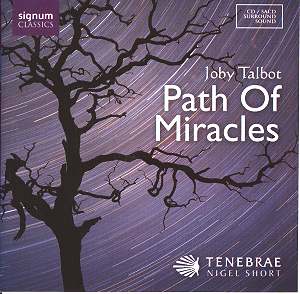Joby Talbot's name
crossed my line of sight when he was
made composer-in-residence by the UK's
Classic FM radio station. Under this
arrangement he wrote one piece a month
with each piece broadcast on a rolling
basis. Talbot previously formed, with
Neil Hannon, the pop group The Divine
Comedy. They produced seven albums and
collaborated with Ute Lemper in the
CD Punishing Kiss (review).
He wrote the music for the BBCTV series
The League of Gentlemen. There
were also two movie soundtracks in 2005:
Hitchhiker's Guide to the Galaxy
and The League of Gentlemen's
Apocalypse.
Path of Miracles
celebrates and meditates upon the
idea of pilgrimage and the specifics
of the Medieval route taken by the scallop
shell bearing pilgrims. The work is
in four movements from Roncesvalles
to Burgos to Leon to the resting place
of St James (Sant Iago), Santiago de
Compostella on Spain's north coast.
Loosely speaking Joby
Talbot's music inhabits, at least in
this work, the world of Tavener in its
approachability, Penderecki in its ululating
moaning and crooning (Roncesvalles)
and Bax's Mater Ora Filium in
its gothic complexity (especially in
Burgos) but thereís a lot more to it.
There is plenty of variety in his writing;
try, for example, the pecked out precision
of 8:47 onwards in Burgos. Leon
opens with an otherworldly stratospheric
carolling-chiming for soprano - this
is a breathtakingly beautiful coup and
there is plenty more. Superbly marked
rhythmic writing can be heard in the
light-footed Orff-style celebration
of the Santiago movement. Itís
eager and rumba-accented.
I should add that this
is a work predominantly for choir. There
is a minimal but significant role for
bells.
When one comes to the
last five minutes the sometime complexity
melts away. Instead the spiritual centre
of gravity of pilgrimage and the sense
of tens of thousands of predecessor
pilgrims registers with great profundity.
The sung words - Latin,
Greek with a host of other languages
in Roncesvalles but mostly English
- are drawn from medieval texts and
the poetry of Robert Dickinson. The
words are fully printed in the excellent
booklet.
This sincerely felt
and communicated work is dedicated to
the composer's father Vincent Talbot
(1915-2005).
The recording is in
surround sound although I experienced
it in conventional stereo and as a CD
not as SACD.
Talbot is quite well
represented on Signum: Mother and
Child SIGCD501; Dream of Herod
SIGCD046.
Tenebrae handle this
work of quietly eloquent virtuosity
with a seeming ease that surely belies
the skills needed to covey such endlessly
subtle and allusive musicmaking.
This is music that
will appeal to anyone with a taste for
a rewarding branch of the new simplicity
(and I intend no denigration in this
generalisation). Talbot has produced
a work of sheer, plangent beauty which
conveys a sense of time-travelling,
profundity and disorientating strangeness.
Rob Barnett


